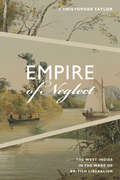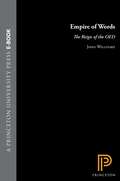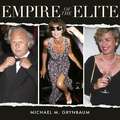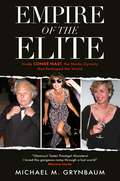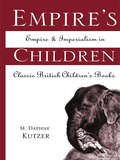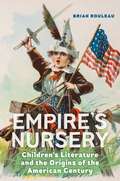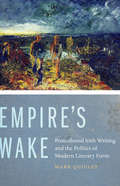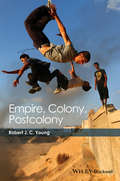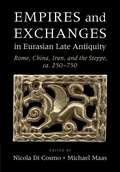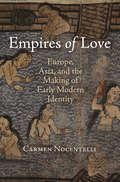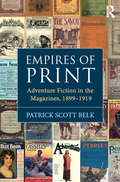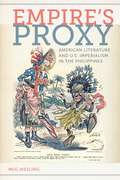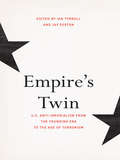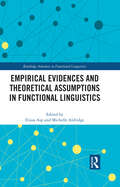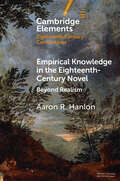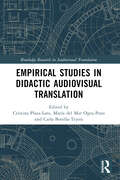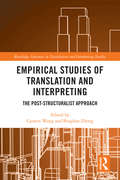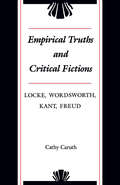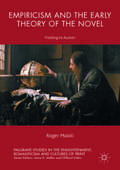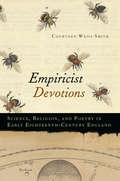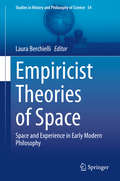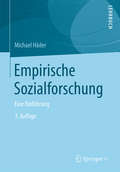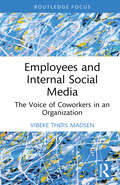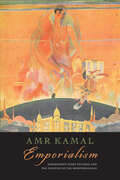- Table View
- List View
Empire of Neglect: The West Indies in the Wake of British Liberalism (Radical Américas)
by Christopher TaylorFollowing the publication of Adam Smith’s The Wealth of Nations, nineteenth-century liberal economic thinkers insisted that a globally hegemonic Britain would profit only by abandoning the formal empire. British West Indians across the divides of race and class understood that, far from signaling an invitation to nationalist independence, this liberal economic discourse inaugurated a policy of imperial “neglect”—a way of ignoring the ties that obligated Britain to sustain the worlds of the empire’s distant fellow subjects. In Empire of Neglect Christopher Taylor examines this neglect’s cultural and literary ramifications, tracing how nineteenth-century British West Indians reoriented their affective, cultural, and political worlds toward the Americas as a response to the liberalization of the British Empire. Analyzing a wide array of sources, from plantation correspondence, political economy treatises, and novels to newspapers, socialist programs, and memoirs, Taylor shows how the Americas came to serve as a real and figurative site at which abandoned West Indians sought to imagine and invent postliberal forms of political subjecthood.
Empire of Words: The Reign of the OED
by John WillinskyWhat is the meaning of a word? Most readers turn to the dictionary for authoritative meanings and correct usage. But what is the source of authority in dictionaries? Some dictionaries employ panels of experts to fix meaning and prescribe usage, others rely on derivation through etymology. But perhaps no other dictionary has done more to standardize the English language than the formidable twenty-volume Oxford English Dictionary in its 1989 second edition. Yet this most Victorian of modern dictionaries derives its meaning by citing the earliest known usage of words and by demonstrating shades of meaning through an awesome database of over five million examples of usage in context. In this fascinating study, John Willinsky challenges the authority of this imperial dictionary, revealing many of its inherent prejudices and questioning the assumptions of its ongoing revision. "Clearly, the OED is no simple record of the language `as she is spoke,'" Willinsky writes. "It is a selective representation reflecting certain elusive ideas about the nature of the English language and people. Empire of Words reveals, by statistic and table, incident and anecdote, how serendipitous, judgmental, and telling a task editing a dictionary such as the OED can be." Willinsky analyzes the favored citation records from the three editorial periods of the OED's compilation: the Victorian, imperial first edition; the modern supplement; and the contemporary second edition composed on an electronic database. He reveals shifts in linguistic authority: the original edition relied on English literature and, surprisingly, on translations, reference works, and journalism; the modern editions have shifted emphasis to American sources and periodicals while continuing to neglect women, workers, and other English-speaking countries. Willinsky's dissection of dictionary entries exposes contradictions and ambiguities in the move from citation to definition. He points out that Shakespeare, the most frequently cited authority in the OED, often confounds the dictionary's simple sense of meaning with his wit and artfulness. He shows us how the most famous four-letter words in the language found their way through a belabored editorial process, sweating and grunting, into the supplement to the OED. Willinsky sheds considerable light on how the OED continues to shape the English language through the sometimes idiosyncratic, often biased selection of citations by hired readers and impassioned friends of the language. Anyone who is fascinated with words and language will find Willinsky's tour through the OED a delightful and stimulating experience. No one who reads this book will ever feel quite the same about Murray's web of words.
Empire of the Elite: Inside Condé Nast, the media dynasty that reshaped the world
by Michael M. Grynbaum'Glamour! Taste! Prestige! Monsters! I loved this gorgeous romp through a lost world' MARINA HYDEFor decades, one company in New York told the world what to buy, value, wear, eat, and even what to think.From its glitzy heyday in the 1980s through to the 2000s, American publishing empire Condé Nast and its magazines - including Vogue, Vanity Fair, the New Yorker and GQ - defined how to live the good life, with its editors and writers creating a vision of luxury and sophistication that shaped cultural and consumer trends and political beliefs the world over.The ultimate influencers, Condé Nast amassed great power but failed to foresee and keep up with the digital revolution that would reduce it to a shadow of its former self.Full of fresh insider reporting and venerated names like Anna Wintour, Tina Brown and Graydon Carter, Empire of the Elite is a groundbreaking exploration of how Condé Nast established itself as a global authority. But it is also a cautionary tale, exposing how class, hubris and technological change shook the dominance of the old media gatekeepers, even as Condé Nast's aesthetic and prestige remain undeniably influential to this day.
Empire of the Elite: Inside Condé Nast, the media dynasty that reshaped the world
by Michael M. Grynbaum'Glamour! Taste! Prestige! Monsters! I loved this gorgeous romp through a lost world' MARINA HYDEFor decades, one company in New York told the world what to buy, value, wear, eat, and even what to think.From its glitzy heyday in the 1980s through to the 2000s, American publishing empire Condé Nast and its magazines - including Vogue, Vanity Fair, the New Yorker and GQ - defined how to live the good life, with its editors and writers creating a vision of luxury and sophistication that shaped cultural and consumer trends and political beliefs the world over.The ultimate influencers, Condé Nast amassed great power but failed to foresee and keep up with the digital revolution that would reduce it to a shadow of its former self.Full of fresh insider reporting and venerated names like Anna Wintour, Tina Brown and Graydon Carter, Empire of the Elite is a groundbreaking exploration of how Condé Nast established itself as a global authority. But it is also a cautionary tale, exposing how class, hubris and technological change shook the dominance of the old media gatekeepers, even as Condé Nast's aesthetic and prestige remain undeniably influential to this day.
Empire's Children: Empire and Imperialism in Classic British Children's Books (Children's Literature and Culture #Vol. 16)
by M. Daphne KutzerEmpire's Children looks at works at by Rudyard Kipling, Frances Hodgson Burnett, E. Nesbit, Hugh Lofting, A.A. Milne, and Arthur Ransome for the ways these writers consciously and unconsciously used the metaphors of empire in their writing for children.
Empire's Nursery: Children's Literature and the Origins of the American Century
by Brian RouleauHow children and children’s literature helped build America’s empireAmerica’s empire was not made by adults alone. During the nineteenth and twentieth centuries, young people became essential to its creation. Through children’s literature, authors instilled the idea of America’s power and the importance of its global prominence. As kids eagerly read dime novels, series fiction, pulp magazines, and comic books that dramatized the virtues of empire, they helped entrench a growing belief in America’s indispensability to the international order.Empires more generally require stories to justify their existence. Children’s literature seeded among young people a conviction that their country’s command of a continent (and later the world) was essential to global stability. This genre allowed ardent imperialists to obscure their aggressive agendas with a veneer of harmlessness or fun. The supposedly nonthreatening nature of the child and children’s literature thereby helped to disguise dominion’s unsavory nature.The modern era has been called both the “American Century” and the “Century of the Child.” Brian Rouleau illustrates how those conceptualizations came together by depicting children in their influential role as the junior partners of US imperial enterprise.
Empire's Wake: Postcolonial Irish Writing and the Politics of Modern Literary Form
by Mark QuigleyShedding new light on the rich intellectual and political milieux shaping the divergent legacies of Joyce and Yeats, Empire’s Wake traces how a distinct postcolonial modernism emerged within Irish literature in the late 1920s to contest and extend key aspects of modernist thought and aesthetic innovation at the very moment that the high modernist literary canon was consolidating its influence and prestige.By framing its explorations of postcolonial narrative form against the backdrop of distinct historical moments from the Irish Free State to the Celtic Tiger era, the book charts the different phases of 20th-century postcoloniality in ways that clarify how the comparatively early emergence of the postcolonial in Ireland illuminates the formal shifts accompanying the transition from an age of empire to one of globalization.Bringing together new perspectives on Beckett and Joyce with analyses of the critically neglected works of Sean O’Faoláin, Frank McCourt, and the Blasket autobiographers, Empire’s Wake challenges the notion of a singular “global modernism” and argues for the importance of critically integrating the local and the international dimensions of modernist aesthetics.
Empire, Colony, Postcolony (Coursesmart Ser.)
by Robert J. YoungEmpire, Colony, Postcolony provides a clear exposition of the historical, political and ideological dimensions of colonialism, imperialism, and postcolonialism, with clear explanations of these categories, which relate their histories to contemporary political issues. The book analyzes major concepts and explains the meaning of key terms. The first book to introduce the main historical and cultural parameters of the different categories of empire, colony, postcolony, nation, and globalization and the ways in which they are analyzed today Explains in clear and accessible language the historical and theoretical origins of postcolonial theory as well as providing a postcolonial perspective on the formations of the contemporary world Written by an acknowledged expert on postcolonialism
Empires and Exchanges in Eurasian Late Antiquity: Rome, China, Iran, And The Steppe, Ca. 250-750
by Michael Maas Nicola Di CosmoEmpires and Exchanges in Eurasian Late Antiquity offers an integrated picture of Rome, China, Iran, and the Steppes during a formative period of world history. <P><P>In the half millennium between 250 and 750 CE, settled empires underwent deep structural changes, while various nomadic peoples of the steppes (Huns, Avars, Turks, and others) experienced significant interactions and movements that changed their societies, cultures, and economies. <P>This was a transformational era, a time when Roman, Persian, and Chinese monarchs were mutually aware of court practices, and when Christians and Buddhists criss-crossed the Eurasian lands together with merchants and armies. It was a time of greater circulation of ideas as well as material goods. <P>This volume provides a conceptual frame for locating these developments in the same space and time. Without arguing for uniformity, it illuminates the interconnections and networks that tied countless local cultural expressions to far-reaching inter-regional ones.<P> Proposes an integrated view of Eurasia during the period ca.250–750 CE that brings together Rome, China, Iran, and the central steppe lands, allowing readers to gain a fresh approach to a coherent transformational period in world history that has not been discussed within these chronological and geographical parameters before.<P> Brings together in an innovative way two areas that are the focus of considerable current interest, late antique studies and silk road studies, offering new methodologies for integrated study.<P> Introduces the concept of 'Eurasian Late Antiquity', which is not based on the centrality of the Roman Mediterranean world, helping readers understand the commonalities, differences, and exchanges over a broad geographic area, including Rome, China, Iran, and the steppe lands between them.
Empires of Love
by Carmen NocentelliThrough literary and historical documents from the early sixteenth to late seventeenth centuries--epic poetry, private correspondence, secular dramas, and colonial legislation--Carmen Nocentelli charts the Western fascination with the eros of "India," as the vast coastal stretch from the Gulf of Aden to the South China Sea was often called. If Asia was thought of as a place of sexual deviance and perversion, she demonstrates, it was also a space where colonial authorities actively encouraged the formation of interracial households, even through the forcible conscription of native brides. In her comparative analysis of Dutch, English, French, Italian, Portuguese, and Spanish texts, Nocentelli shows how sexual behaviors and erotic desires quickly came to define the limits within which Europeans represented not only Asia but also themselves.Drawing on a wide range of European sources on polygamy, practices of male genital modification, and the allegedly excessive libido of native women, Empires of Love emphasizes the overlapping and mutually transformative construction of race and sexuality during Europe's early overseas expansion, arguing that the encounter with Asia contributed to the development of Western racial discourse while also shaping European ideals of marriage, erotic reciprocity, and monogamous affection.
Empires of Print: Adventure Fiction in the Magazines, 1899-1919
by Patrick Scott BelkAt the turn of the twentieth century, the publishing industries in Britain and the United States underwent dramatic expansions and reorganization that brought about an increased traffic in books and periodicals around the world. Focusing on adventure fiction published from 1899 to 1919, Patrick Scott Belk looks at authors such as Joseph Conrad, H.G. Wells, Conan Doyle, and John Buchan to explore how writers of popular fiction engaged with foreign markets and readers through periodical publishing. Belk argues that popular fiction, particularly the adventure genre, developed in ways that directly correlate with authors’ experiences, and shows that popular genres of the late nineteenth and early twentieth centuries emerged as one way of marketing their literary works to expanding audiences of readers worldwide. Despite an over-determined print space altered by the rise of new kinds of consumers and transformations of accepted habits of reading, publishing, and writing, the changes in British and American publishing at the turn of the twentieth century inspired an exciting new period of literary invention and experimentation in the adventure genre, and the greater part of that invention and experimentation was happening in the magazines.
Empire’s Proxy: American Literature and U.S. Imperialism in the Philippines (American Literatures Initiative #1)
by Meg WeslingPart of the American Literatures Initiative Series In the late nineteenth century, American teachers descended on the Philippines, which had been newly purchased by the U.S. at the end of the Spanish-American War. Motivated by President McKinley’s project of “benevolent assimilation,” they established a school system that centered on English language and American literature to advance the superiority of the Anglo-Saxon tradition, which was held up as justification for the U.S.’s civilizing mission and offered as a promise of moral uplift and political advancement. Meanwhile, on American soil, the field of American literature was just being developed and fundamentally, though invisibly, defined by this new, extraterritorial expansion.Drawing on a wealth of material, including historical records, governmental documents from the War Department and the Bureau of Insular Affairs, curriculum guides, memoirs of American teachers in the Philippines, and 19th century literature, Meg Wesling not only links empire with education, but also demonstrates that the rearticulation of American literary studies through the imperial occupation in the Philippines served to actually define and strengthen the field. Empire’s Proxy boldly argues that the practical and ideological work of colonial dominance figured into the emergence of the field of American literature, and that the consolidation of a canon of American literature was intertwined with the administrative and intellectual tasks of colonial management.
Empire’s Twin: U.S. Anti-imperialism from the Founding Era to the Age of Terrorism
by Jay Sexton Ian TyrrellAcross the course of American history, imperialism and anti-imperialism have been awkwardly paired as influences on the politics, culture, and diplomacy of the United States. The Declaration of Independence, after all, is an anti-imperial document, cataloguing the sins of the metropolitan government against the colonies. With the Revolution, and again in 1812, the nation stood against the most powerful empire in the world and declared itself independent. As noted by Ian Tyrrell and Jay Sexton, however, American "anti-imperialism was clearly selective, geographically, racially, and constitutionally." Empire's Twin broadens our conception of anti-imperialist actors, ideas, and actions; it charts this story across the range of American history, from the Revolution to our own era; and it opens up the transnational and global dimensions of American anti-imperialism. By tracking the diverse manifestations of American anti-imperialism, this book highlights the different ways in which historians can approach it in their research and teaching. The contributors cover a wide range of subjects, including the discourse of anti-imperialism in the Early Republic and Civil War, anti-imperialist actions in the U.S. during the Mexican Revolution, the anti-imperial dimensions of early U.S. encounters in the Middle East, and the transnational nature of anti-imperialist public sentiment during the Cold War and beyond. Contributors: Laura Belmonte, Oklahoma State University; Robert Buzzanco, University of Houston; Julian Go, Boston University; Alan Knight, University of Oxford; Ussama Makdisi, Rice University; Erez Manela, Harvard University; Peter Onuf, Robert H. Smith International Center for Jefferson Studies, Monticello, and University of Virginia; Jeffrey Ostler, University of Oregon; Patricia Schechter, Portland State University; Jay Sexton, University of Oxford; Ian Tyrrell, University of New South Wales
Empirical Evidences and Theoretical Assumptions in Functional Linguistics (Routledge Advances in Functional Linguistics)
by Elissa AspThis collection explores the relationships between theory and evidences in functional linguistics, bringing together perspectives from both established and emerging scholars. The volume begins by establishing theoretical common ground for functional approaches to language, critically discussing empirical inquiry in functional linguistics and the challenges and opportunities of using new technologies in linguistic investigations. Building on this foundation, the second part of the volume explores the challenges involved in using different data sources as evidence for theorizing language and linguistic processes, drawing on work on lexical cohesion in language variation, neuroimaging and neuropathological data, and keystroke logging and eye-tracking. The final section of the volume examines the ways in which evidences from a wide range of data sources can offer new perspectives toward challenging established theoretical claims, employing empirical evidences from corpus linguistic analysis, keystroke logging, and multimodal communication. This pioneering collection synthesizes perspectives and addresses fundamental questions in the investigation of the relationships between theory and evidences in functional linguistics and will be of particular interest to researchers working in the field, as well as linguists working in experimental and interdisciplinary approaches which seek to bridge this gap.
Empirical Evidences and Theoretical Assumptions in Functional Linguistics (Routledge Advances in Functional Linguistics)
by Elissa AspThis collection explores the relationships between theory and evidences in functional linguistics, bringing together perspectives from both established and emerging scholars. The volume begins by establishing theoretical common ground for functional approaches to language, critically discussing empirical inquiry in functional linguistics and the challenges and opportunities of using new technologies in linguistic investigations. Building on this foundation, the second part of the volume explores the challenges involved in using different data sources as evidence for theorizing language and linguistic processes, drawing on work on lexical cohesion in language variation, neuroimaging and neuropathological data, and keystroke logging and eye-tracking. The final section of the volume examines the ways in which evidences from a wide range of data sources can offer new perspectives toward challenging established theoretical claims, employing empirical evidences from corpus linguistic analysis, keystroke logging, and multimodal communication. This pioneering collection synthesizes perspectives and addresses fundamental questions in the investigation of the relationships between theory and evidences in functional linguistics and will be of particular interest to researchers working in the field, as well as linguists working in experimental and interdisciplinary approaches which seek to bridge this gap.
Empirical Knowledge in the Eighteenth-Century Novel: Beyond Realism (Elements in Eighteenth-Century Connections)
by Aaron R. HanlonThis Element examines the eighteenth-century novel's contributions to empirical knowledge. Realism has been the conventional framework for treating this subject within literary studies. This Element identifies the limitations of the realism framework for addressing the question of knowledge in the eighteenth-century novel. Moving beyond the familiar focus in the study of novelistic realism on problems of perception and representation, this Element focuses instead on how the eighteenth-century novel staged problems of inductive reasoning. It argues that we should understand the novel's contributions to empirical knowledge primarily in terms of what the novel offered as training ground for methods of reasoning, rather than what it offered in terms of formal innovations for representing knowledge. We learn from such a shift that the eighteenth-century novel was not a failed experiment in realism, or in representing things as they are, but a valuable system for reasoning and thought experiment.
Empirical Studies in Didactic Audiovisual Translation (Routledge Research in Audiovisual Translation)
by Cristina Plaza-LaraThis collection showcases a wide range of empirical studies in didactic audiovisual translation (DAT), fostering replication of the present work to encourage future research and further expansion of DAT’s applications in language learning settings. The book seeks to offer a complementary perspective with the spotlight on empirical work, building on previous lines of inquiry rooted in descriptive analysis and the “experimental turn.”The volume is divided into three parts, aiming to bring together disparate studies from a range of classroom contexts and educational levels which draw on a mixed-methods approach in one place. The first part features research on captioning, or written language transfer, while the second includes on studies on revoicing, or oral language transfer. A final section looks at combined studies integrating both revoicing and captioning, while looking ahead to possibilities for new lines of empirically grounded research on the use of audiovisual modes at the intersection of translation and foreign language education.This volume will be of interest to students and scholars in audiovisual translation, translation studies, language education, and technology and language learning.
Empirical Studies of Translation and Interpreting: The Post-Structuralist Approach (Routledge Advances in Translation and Interpreting Studies)
by Caiwen Wang and Binghan ZhengThis edited book is a collection of the latest empirical studies of translation and interpreting (T&I) from the post-structuralist perspective. The contributors are professors, readers, senior lecturers, lecturers, and research students from an international context. The contributions are characterised by five themes: Intervention in T&I Process of T&I Product of T&I T&I and technology T&I education These up-to-date topics are reflective of the shift in attitudes that is being witnessed as a new generation of translation scholars rejects the subjective assertions of previous generations, in favour of an altogether more rigorous approach. The book will notably contribute to the development of T&I and enhance our knowledge of the areas. It will be a useful reference for academics, postgraduate research students, and professional translators and interpreters. The book will also play a role in proposing practical and empirically based ways of training for universities and the industry, so as to overcome traditional barriers to translation and interpreting learning. The book will additionally provide reference material for relevant professional bodies.
Empirical Truths and Critical Fictions: Locke, Wordsworth, Kant, Freud
by Cathy CaruthIn the prevailing account of English empiricism, Locke conceived of self-understanding as a matter of mere observation, bound closely to the laws of physical perception. English Romantic poets and German critical philosophers challenged Locke's conception, arguing that it failed to account adequately for the power of thought to turn upon itself—to detach itself from the laws of the physical world. Cathy Caruth reinterprets questions at the heart of empiricism by treating Locke's text not simply as philosophical doctrine but also as a narrative in which "experience" plays an unexpected and uncanny role. Rediscovering traces and transformations of this narrative in Wordsworth, Kant, and Freud, Caruth argues that these authors must not be read only as rejecting or overcoming empirical doctrine but also as reencountering in their own narratives the complex and difficult relation between language and experience.Beginning her inquiry with the moment of empirical self-reflection in Locke's Essay Concerning Human Understanding—when a mad mother mourns her dead child—Caruth asks what it means that empiricism represents itself as an act of mourning and explores why scenes of mourning reappear in later texts such as Wordsworth's Prelude, Kant's Metaphysical Foundations of Natural Science and Prolegomena to Any Future Metaphysics, and Freud's Civilization. From these readings Caruth traces a recurring narrative of radical loss and the continual displacement of the object or the agent of loss. In Locke it is the mother who mourns her dead child, while in Wordsworth it is the child who mourns the dead mother. In Kant the father murders the son, while in Freud the sons murder the father.As she traces this pattern, Caruth shows that the conceptual claims of each text to move beyond empiricism are implicit claims to move beyond reference. Yet the narrative of death in each text, she argues, leaves a referential residue that cannot be reclaimed by empirical or conceptual logic. Caruth thus reveals, in each of these authors, a tension between the abstraction of a conceptual language freed from reference and the compelling referential resistance of particular stories to abstraction.
Empiricism and the Early Theory of the Novel
by Roger MaioliThis book is about the empiricist challenge to literature, and its influence on eighteenth-century theories of fiction. British empiricism from Bacon to Hume challenged the notion that imaginative literature can be a reliable source of knowledge. This book argues that theorists of the novel, from Henry Fielding to Jane Austen, recognized the force of the empiricist challenge but refused to capitulate. It traces how, in their reflections on the novel, these writers attempted to formulate a theoretical link between the world of experience and the products of the imagination, and thus update the old defenses of poetry for empirical times. Taken together, the empiricist challenge and the responses it elicited signaled a transition in the longstanding debate about literature and knowledge, as an inaugural round in the persisting conflict between the empirical sciences and the literary humanities.
Empiricist Devotions: Science, Religion, and Poetry in Early Eighteenth-Century England
by Courtney Weiss SmithFeaturing a moment in late seventeenth- and early eighteenth-century England before the disciplinary divisions that we inherit today were established, Empiricist Devotions recovers a kind of empiricist thinking in which the techniques and emphases of science, religion, and literature combined and cooperated. This brand of empiricism was committed to particularized scrutiny and epistemological modesty. It was Protestant in its enabling premises and meditative practices. It earnestly affirmed that figurative language provided crucial tools for interpreting the divinely written world. Smith recovers this empiricism in Robert Boyle's analogies, Isaac Newton's metaphors, John Locke's narratives, Joseph Addison's personifications, Daniel Defoe's diction, John Gay's periphrases, and Alexander Pope's descriptive particulars. She thereby demonstrates that "literary" language played a key role in shaping and giving voice to the concerns of eighteenth-century science and religion alike. Empiricist Devotions combines intellectual history with close readings of a wide variety of texts, from sermons, devotional journals, and economic tracts to georgic poems, it-narratives, and microscopy treatises. This prizewinning book has important implications for our understanding of cultural and literary history, as scholars of the period's science have not fully appreciated figurative language's central role in empiricist thought, while scholars of its religion and literature have neglected the serious empiricist commitments motivating richly figurative devotional and poetic texts.Winner of the Walker Cowen Memorial Prize for an Outstanding Work of Scholarship in Eighteenth-Century Studies
Empiricist Theories of Space: Space and Experience in Early Modern Philosophy (Studies in History and Philosophy of Science #54)
by Laura BerchielliThis book explores the notions of space and extension of major early modern empiricist philosophers, especially Locke, Berkeley, Hume, and Condillac. While space is a central and challenging issue for early modern empiricists, literature on this topic is sparse. This collection shows the diversity and problematic unity of empiricist views of space. Despite their common attention to the content of sensorial experience and to the analytical method, empiricist theories of space vary widely both in the way of approaching the issue and in the result of their investigation. However, by recasting the questions and examining the conceptual shifts, we see the emergence of a programmatic core, common to what the authors discuss. The introductory chapter describes this variety and its common core. The other contributions provide more specific perspectives on the issue of space within the philosophical literature. This book offers a unique overview of the early modern understanding of these issues, of interest to historians of early modern philosophy, historians and philosophers of science, historians of ideas, and all readers who want to expand their knowledge of the empiricist tradition.
Empirische Sozialforschung: Eine Einführung
by Michael HäderSozialwissenschaftliche Methoden wie Befragungen, Beobachtungen und Inhaltsanalysen kommen in der Marktforschung, bei Studien zur Zeitgeschichte, in der Stadtplanung und in der Kommunikationsforschung zum Einsatz. Erst recht werden sie von Soziologen und empirisch arbeitenden Politikwissenschaftlern benötigt. Egal, ob im Rahmen der Evaluation eines Präventionsprogramms oder für die Erhebung des Gesundheitsverhaltens oder für eine Studie zur sozialen Mobilität, die sichere Handhabung des sozialwissenschaftlichen Instrumentariums ist stets die Voraussetzung, um belastbare Ergebnisse zu erzielen. Das Buch stellt wichtige Informationen für die Anwender und Entwickler dieser Instrumente zur Verfügung. Es behandelt die theoretischen Grundlagen der Methoden, die Schritte bei der Konzipierung und Umsetzung eines Projekts, die vielfältigen Varianten der Datenerhebung, die bei der Auswahl der Untersuchungseinheiten einzusetzenden Methoden ebenso wie die Prinzipien, die bei der Auswertung und Dokumentation der Befunde zu beachten sind. Mithilfe zahlreicher Beispiele gelingt eine besonders anschauliche Darstellung.
Employees and Internal Social Media: The Voice of Coworkers in an Organization (Routledge Research in Public Relations)
by Vibeke Thøis MadsenThis book explores the benefits and challenges of employees communicating on internal social media (ISM) and how employee communication can develop and construct an organisation.Drawing from the latest research, the book identifies ISM's potential uses, such as sharing knowledge and viewpoints and connecting across departments, hierarchical levels and geographical distances. It argues that ISM can pave the way to create participatory and multivocal communication that can involve and engage employees in a different way than other internal communication channels. Further themes include strategic internal listening, the importance of open communication, and communicative leadership and coworkership. It features cases, examples and practical instructions to tie research into practice.This title is relevant to academics and practitioners in the fields of strategic communication and organisational communication.
Emporialism: Department Store Fictions and the Politics of the Mediterranean
by Amr KamalThis book examines what Amr Kamal calls the phenomenon of emporialism, or the convergence between the spaces and imaginaries of empires and emporia in the context of a modern Mediterranean divided among the British, French, and Ottoman empires. By "emporia," Kamal refers to the commercial network of nineteenth-century department stores, which gained prominence after the Suez Canal project. Taking as a focal point French and Egyptian department stores, the author examines emporialism as a set of phenomenological experiences, discursive and social praxes, and mechanisms of control and resistance, born from the intersection of modernity, colonialism, and mass consumption. Drawing on archival evidence, Kamal reads iconographic and literary representations of emporia in English, French, Arabic, and Hebrew, from the nineteenth century to the present, addressing works by Émile Zola, Huda Shaarawi, Jacqueline Kahanoff, and others. Emporialism, Kamal argues, served to rewrite the history of the Mediterranean, to reinvent national belonging, and to interrogate issues of modernity and social justice.
